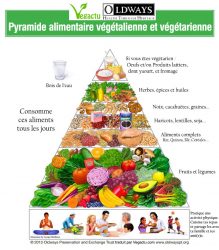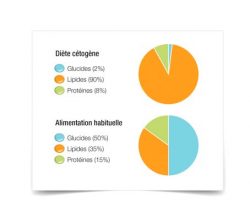the benefits of the ketogenic diet, More fat, less sugar :

Lots of fat and little sugar : that’s the recipe for the ketogenic diet, which is said to help shed unwanted pounds. A surprising method, which goes against certain current recommendations, but which could have an impact on several chronic diseases such as Alzheimer’s or cancer. How does it work ? What are its limits? Magali Walkowicz, dietician and nutritionist, explains.
The principle
The ketogenic diet is based on a simple principle: very little sugar and very little fat. “The ketogenic diet is high in fat, low in protein and very low in carbohydrates,” explains Magali Walkowicz. Our bodies naturally produce glucose from the proteins and fats present in our bodies: “so there’s no need to consume any extra”. By following this diet, the liver begins to produce small molecules called ketones, which become sources of energy for the body. The body no longer runs on glucose, but on ketones and fats, which are responsible for our extra kilos.
Developed almost 100 years ago, this diet, renowned for its anti-convulsant effects, was first used to treat children suffering from epilepsy. In recent years, the diet has been back in vogue, demonstrating its benefits for weight loss. But it’s most in the news for its therapeutic virtues in the treatment of certain chronic illnesses, such as cancer and Alzheimer’s disease. It is thought to have a positive effect on these diseases, via the ketones that deliver energy to healthy cells – in the case of cancer – or neurons – in the case of Alzheimer’s disease.
Food basics

Find the hidden sugars in 1,500 foods with Le compteur de glucides by Magali Walkowicz, ed Thierry Souccar.
The diet is based on two food categories:
– Fats or lipids such as oil, olives, butter, cream, nuts…
- proteins such as soy… seitan , spirulina algae, chia seeds, tempeh ,ect….
“In a normal diet, on average 50% of calories come from carbohydrates, 35% from fats and 15% from proteins. On the ketogenic diet, calories are made up of 90% fat, 8% protein and 2% carbohydrates,” explains Magali Walkowicz.
In other words, in terms of quantity, this means consuming less than 50 g of carbohydrates per day and 3 g of fat for every 1 g of non-fat (carbohydrates plus protein).
Permitted foods
“The advantage of the ketogenic diet is that it’s gourmet, which means you can vary the pleasures,” says Magali Walkowicz. Many foods are allowed, such as “most vegetables that can be used routinely (150 g at lunch and 150 g at dinner) or oilseeds such as walnuts, hazelnuts, pecans or macadamia nuts, pistachios, peanuts… But also meat, fish, eggs with aromatic herbs, for example, and even cheese, which contains no sugar.”
Foods to be eaten in moderation
Fruit should not be excluded, but its consumption should be limited as it is rich in sugar. Generally speaking, contains 12g of sugar per 100g of fruit. “Among these fruits, “red berries such as strawberries, blueberries, raspberries, redcurrants can be eaten up to 50 g a day. “Added to this list are yogurts, which naturally contain 5g of lactose, in other words, milk sugar. So prefer Greek-style yogurts, which are very fatty.”
Prohibited foods
Avoid starchy foods such as rice and pasta, which can be replaced by
konjac pasta
. And of course, avoid table sugar and cakes.
What are the effects on health?
The ketogenic diet is said to have a positive impact on cancer sufferers. Our healthy cells feed mainly on fats, whereas cancer cells draw their energy from the sugar we consume. ” By following this diet, tumors have reduced access to their food of choice: sugar. Less sugar means less energy for cancer cells. More fat means more ketones for healthy cells. This diet therefore specifically strengthens the healthy parts of the body without benefiting cancer cells,” she adds.
Alzheimer’s disease has the particularity of preventing neurons from using glucose, which is usually their primary source of energy. Without energy, it’s impossible to function. ” Hence the idea of providing ketones, i.e. fats, which can be used by brain cells instead of sugar.

Controlling your weight
Do your menus include all the daily requirements? What are your eating habits? Take the test: Do you eat a balanced diet?
While the ketogenic diet can be useful for anyone wishing to lose – or gain – weight, it is imperative to seek the advice of a doctor or dietician before embarking on it. And to be vigilant afterwards!
The diet is very well tolerated, even if it can be a little uncomfortable at first. “It may take a few days for the body to keto-adapt, i.e. to change fuels. Patients may suffer from headaches, nausea or fatigue, and this is precisely the proof that the diet works.
The results are clear: blood balances improve, cravings are gone and you really do feel better. “Another advantage is that the ketogenic diet avoids the yo-yo effect… as long as the person maintains a low-sugar diet. For people in good health, stopping this diet should be followed by a low-carb diet (i.e. low in carbohydrates, carbohydrates) so as not to regain weight,” warns Magali Walkowicz.
For people suffering from Alzheimer’s or Parkinson’s disease, it needs to be monitored for life. Finally, however, there are contraindications for people with type 1 diabetes, metabolic abnormalities involving fatty acid oxidation, or people with respiratory deficiencies or hepato-cellular insufficiency.”
